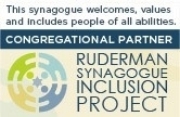Young Israel of Brookline
The “9 Days” started Sunday evening 8/4 with Rosh Chodesh Av
Schedule for Erev Tisha B’Av - Monday, August 12, 2024
Mincha: 6:15 pm In Shul and via Zoom
Return home for Seudah Hamafseket with an egg and/or ashes
Eating not permitted after: 7:48 pm
Please bring your own low chair or stepstool to sit on.
Ma’ariv: 8:10 pm In Shul and via Zoom
Aicha and Kinot: Following Maariv
Late Aicha Reading: 10:30 pm
Tisha B’Av - Tuesday, Monday, August 13, 2024
Shacharit (without Tallit and Tefillin) In Shul and via Zoom.
1st Minyan: 6:00 am followed by Kinot
2nd Minyan: 8:30 am followed by Kinot
Following the second Minyan, Kinot will be led by Rabbi Hellman who will teach, explain, and elaborate on several main Kinot. We will read them slowly and in depth. In Shul and via Zoom.
12:48 pm Chatzot
Yeshiva University is hosting a live Tisha B’Av
webcast all day with Kinot in the morning and shiurim in the afternoon from multiple teachers.
For the full schedule and to sign on go to www.yutorah.org/tishabav
The OU Tisha B’Av video
Rabbi Steve Weil Live beginning at 9:00 am www.ou.org/tishabav
Tisha B’av Afternoon Etzion Foundation Film Screening
“Serving on All Fronts” 5:30 pm @ Maimonides
The story of Gush students during operation Swords of Iron
Sponsored by the Maimonides Kehilla in conjunction with the Young Israel of Brookline
Mincha (with Tallit and Tefillin): 7:15 pm In Shul and via Zoom
Ma’ariv: 7:55 pm Fast Ends: 8:30 pm
The Nine Days
Building construction should be suspended during the Nine Days. Included is any construction of simcha, beauty or pleasure not required for dwelling. Therefore, a pleasure or vacation home, patio and the like may not be constructed during the Nine Days. Similarly, painting, wallpapering and other forms of home decorating should not take place during the Nine Days. Construction of a synagogue is permitted during the Nine Days.
One should refrain from eating meat and fowl, and drinking wine because they are generally associated with simcha that is inappropriate during these days. Furthermore, we thereby recall the discontinuation of the sacrificial procedures that resulted after the destruction of the Bait HaMikdash. Parve food cooked in a meat utensil, may be eaten. Meat and wine are permitted during Shabbat or at a seudat mitzvah. Wine may be used for Havdalah; an adult may drink the Havdalah wine if a young child is not present to do so.
A mourner during shloshim may not clean nor launder his clothing, nor may he wear freshly laundered clothing. Similarly, one should not clean or launder clothing, nor wear freshly laundered clothing during the Nine Days. Undergarments, socks and pajamas are not included in this category. If all of one's garments have become soiled, laundering is permissible until the Shabbat before Tisha B'Av. Children's diapers and clothing may be washed, even during the week in which Tisha B'Av occurs.
New clothing should not be purchased during the Nine Days, even if they are not needed until after Tisha B'Av.
One should not swim or bathe for pleasure during this time. When a person bathes for cleanliness, to remove dirt or sweat, or because the person is uncomfortable, he should bathe in water that is cooler than usual and the bath should be quicker than usual to make it clear that the bathing is not for pleasure.
Tisha B'Av
Since these Five tragedies befell the Jewish people on Tisha B'Av, this day has been declared a fast day.
1. It was decreed that the generation of the Exodus would remain in the desert and not enter the Land of Israel.
2. The first Bait HaMikdash was destroyed on Tisha B'Av.
3. The second Bait HaMikdash was destroyed on Tisha B'Av.
4. The city of Betar was captured and tens of thousands of Jews were killed.
5. The wicked Turnus Rufus plowed the site of the Bait HaMikdash and its surroundings.
On Tisha B'Av it is prohibited to eat, drink, bathe or wash, anoint oneself, engage in marital relations, wear shoes or sneakers made entirely or partially of leather, or learn Torah with the exception of those portions which sadden the heart. On Tisha B'Av one may learn the following:
1. Job and its commentaries.
2. Those portions of Jeremiah or other prophets which deal with tragedy and destruction.
3. Aicha, the Midrash on Aicha and its commentaries and Kinot.
4. The third perek in Moed Katan, which deals with mourning.
5. The story of the destruction, in Gittin (56b - 58a).
6. The story of the destruction, in Sanhedrin (104a & b).
7. The story of the destruction, in Josephus.


